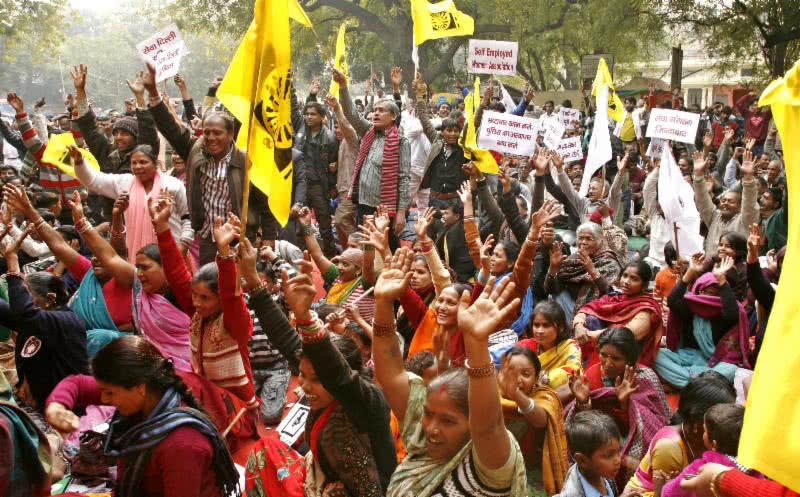
Collective Bargaining is usually understood as taking place between an employer and employees to achieve a collective agreement, primarily around wages and working conditions. (See the International Labour Organization’s definition of collective bargaining: C154: Collective Bargaining Convention, 1981 [No.154]).
Workers in the informal economy, including own account workers, also engage in forms of collective bargaining through their membership-based organizations (MBOS). However, their counterparts across the table are often not employers. Street vendors most often negotiate with local authorities, for example, and with different municipal departments on issues such as with police regarding harassment and confiscation of goods. Waste pickers negotiate with local authorities for storage and sorting facilities or, more ambitiously, for the right to provide collection and recycling services for which they are paid. Many need to negotiate with buyers for better prices for recyclables.
Read WIEGO Working Paper #38:Collective Bargaining by Informal Workers in the Global South: Where and How It Takes Place (2018) by Françoise Carré, Pat Horn and Chris Bonner
Unlike workers in the formal economy whose rights are usually laid down in labour statutes, most informal workers do not have statutory collective bargaining rights. While the right has been acknowledged by the ILO (see Resolution and Conclusions Concerning Decent Work in the Informal Economy, ILC, 90th Session, 2002), including for own account workers, it has not generally been extended to these workers.
Most often, negotiations take place in ad hoc meetings – often arising out of a crisis – or in consultative forums without statutory obligation on the part of the authorities, and without enforceable agreements or continuity. While dialogues, consultations, or meetings to resolve immediate disputes play a role in enabling informal workers to raise their voices and make gains, agreements reached can be easily ignored or undermined.
However, as the case studies listed below outline, increasingly informal workers are finding a place at the table: with national and local governments – or, in the case of domestic workers, in forums involving employers.
 Informal workers are also finding a voice in international negotiating forums, especially at the annual International Labour Conference of the ILO.
Informal workers are also finding a voice in international negotiating forums, especially at the annual International Labour Conference of the ILO.
Related Reading
See Yes, We Did It! to learn how domestic workers secured an international Convention on decent work.
WIEGO’s Recent Research and Case Studies
WIEGO and the AFL-CIO’s Solidarity Center in the USA collaborated on research that looked at collective bargaining in the informal economy. Debbie Budlender in South Africa led the project. A team of researchers analyzed five cases and produced case studies:
- the Georgian Transport Workers Union:
Collective Bargaining Among Transport Workers in Georgia - the National Petty Traders Union of Liberia:
Collective Bargaining Negotiations Between Street Vendors and City Government in Monrovia, Liberia - waste picker co-operatives in Minas Gerais, Brazil:
Negotiating the Recycling Bonus Law: Waste Pickers and Collective Bargaining in Minas Gerais, Brazil - home-based bidi workers who are members of SEWA in India:
Collective Bargaining by Workers of the Indian Unorganized Sector: Struggle, Process, Achievements, and Learning - Domestic Workers' Union of Uruguay
(Sindicato Unico de Trabajadoras Domésticas – SUDT)
Collective Bargaining and Domestic Workers in Uruguay | en español
An overview report has been published as a WIEGO Organizing Brief: Informal Workers and Collective Bargaining: Five Case Studies by Debbie Budlender.
Other Resources
- StreetNet has produced a series of case studies and a composite report on collective bargaining and representative forums for street vendors.
- StreetNet has developed a guideline document, “Towards a Model Framework for a Local Level Collective Bargaining System for Street Traders”. This framework will be used by affiliates of StreetNet in their struggles to set up permanent negotiating forums with local authorities.
- WIEGO and StreetNet have produced a handbook on Collective Negotiations for Informal Workers as part of the Organizing in the Informal Economy: Resource Books for Organizers Series.
- ITUC has produced “Collective Bargaining, Collective Voices.”